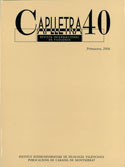Panoràmica de la traducció entre espanyol i català en els àmbits literari i audiovisual
DOI:
https://doi.org/10.7203/caplletra.40.4849Paraules clau:
Translation, Spanish, Catalan, Literature, audiovisual Media Resum
Resum
In this article the current situation of translation between Catalan and Spanish is drawn into two areas of speciality strongly intertwined: the literary and the audiovisual one.
The aim is to approach to a translation practice which is hardly known and studied. It is a young practice, still a minority but with its own traits and characteristics. Young, because we have had to wait for Catalan to start its normalization process before being able to find translations between Catalan and Spanish; a minority because it is not present in all professional areas; and it is not prototypical because it is a type of translation which does not necessarily abide to the criteria of intelligibility (which is, after all, the reason for being of the translation): translate to make understand. In the case of Catalan and Spanish it does not always obey to this purpose because both languages are known by most speakers of the Catalan-speaking zones.
The present work provides a revision of two of the areas in which it is present nowadays, such as the literary and the audiovisual ones, with the purpose of making this type of translation known in order to fill in an obvious gap in translation Studies. In consequence, the reasons that explain its presence or absence (many of them linked to political decisions) will be analysed as well as the trends that can be examined.
 Descàrregues
Descàrregues
Descàrregues
Publicades
Com citar
-
Resum538
-
PDF240
Número
Secció
Llicència
L’autor o autora que adrece un treball a la redacció de Caplletra perquè siga publicat ha de ser la persona titular legítima dels drets d'explotació. La legitimació per a la publicació del treball ha d’incloure també les imatges, les taules, els gràfics i altres materials que puguen complementar el text, amb independència de si n'és l'autor o autora.
Copyright. Quan publica el treball en la revista, l'autor o autora cedeix a Caplletra. Revista Internacional de Filologia els drets d'explotació (reproducció, distribució i comunicació pública), tant per a l'edició impresa en paper com per a la versió electrònica, que serà accessible mitjançant la xarxa Internet.
Tots els treballs publicats en Caplletra es troben sota una llicència Creative Commons del tipus Reconeixement-NoComercial-SenseObraDerivada 4.0.
RESPONSABILITAT
Caplletra. Revista Internacional de Filologia no s'identifica necessàriament amb els punts de vista mantinguts en els treballs que publica.
Caplletra. Revista Internacional de Filologia declina tota responsabilitat derivada de qualsevol vulneració eventual dels drets de propietat intel·lectual que poguera ser duta a terme pels autors o autores.






